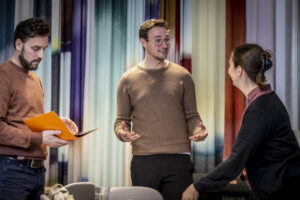Organizations operating as standalone entities? It is my sincere conviction they will cease to exist within a decade. We can no longer ignore the increasingly assertive ecosystem in (and from) which we profit. Connecting will need to become both extended and enhanced. And that’s where teams come in. Often being the interface with the ecosystem, they play a crucial role. That’s why for several years now we have been working intensely with teams regarding connectedness. That’s how I got to experience what I would call… the power of the pack.
Legacy has often grown us into working environments based on old models of cooperation. Devastating, in my opinion, looking at todays market conditions and fast changing society. Connected. Aligned. Responsive. That’s how at Beanmachine we design future proof habitats in organizations. And to accelerate teams to get in that modus we introduce them to… scrum.
You may already be familiar with the corporate term Scrum as defined by Ken Schwaber and Jeff Sutherland, rooted in IT development: Scrum (n): A framework within which people can address complex adaptive problems, while productively and creatively delivering products of the highest possible value. The IT department was indeed the first to be puzzled by upcoming technology and a rapidly changing environment a few decades back. Today the entire organization faces this very same challenge. So when I myself joined Jeff in Amsterdam for his ‘certified Scrum master’ class some years ago, I was there for exactly that reason. If you want to learn more, check http://www.scrumguides.org where you can find a lot of great and still very actual stuff on this framework.
The difference between boys and men
However, there’s this other kind of scrum I had in mind writing this blog. In my younger days I used to play rugby. In that period I got to know the original rugby scrum (and forever realized the difference between boys and men). A scrum or scrummage in rugby is a method to restart the play: players packing closely together, heads down and attempting to gain possession of the ball. And after every accidental infringement they repeat the same raw head-on group collision. Check: https://en.wikipedia.org/wiki/Scrum_(rugby).
As savage as it may look, the rugby scrum is the perfect metaphor for how we at Beanmachine work with teams. When the ‘ball has gone out of play’ or an ‘accidental infringement’ occurs, team members need to ‘pack closely’ (connect) and work together to regain ‘possession of the ball’. That’s exactly how we approach teams and task forces. As contexts are changing on the spot and complexity increases as we speak, we often see how teams paralyze (mostly scared of making mistakes). That’s why throughout the years we have been designing smart machinery to cope with just that. Assessments, tools, storyboards,… all kinds of stuff for teams and task forces to help them focus ànd develop within today’s challenging environment. You can check it all our here, in short we get teams to dive into the following 5 aspects of their teamwork:
- WHY: comprehending and determining the assignment as a team.
- WHAT: shaping the assignment and dealing with it as a team.
- HOW: building relationships and evolving maturity as a team.
- WHO: expanding the team’s network and influence within the organization/company.
- DEVELOP: learning and developing as one team
The power of the pack
Tools and skills are one, mindset still is another. In my experience the most important mindshift in teams is to stop avoiding ‘the ball going out of play’. It simply is part of the game, like it or not. So instead of pulling up a (time and energy consuming) defense just to avoid making mistakes, we at Beanmachine encourage teams to do the opposite: let’s take risks, let’s embrace failure, and this way learn fast and re-engage in the game. At this point we urge teams to closely pack together and truly support each other on this vulnerable process by being open, honest and by cultivating bravery. And, people, here is where the magic happens, where teams start making a difference, where you really get to feel the power of the pack. To really feel it, you need to witness it life, but here’s a quick video to give you just a glimpse of how that could look like.
Let’s not kid each other though: the first time I was engaged in a rugby scrum, I was just terrified. And in my experience it’s exactly the same with teams: their first scrum is always frightening. So it’s not just kick and rush, teams do need support to get beyond their first fear. Only then they can clear their mindset and start experiencing on their WHY, WHAT, HOW and WHO. Only then they can really start to DEVELOP as a team. And here’s a fun movie you could use as an icebreaker to make that point: The Formula 1 Scrum. Let’s connect!





